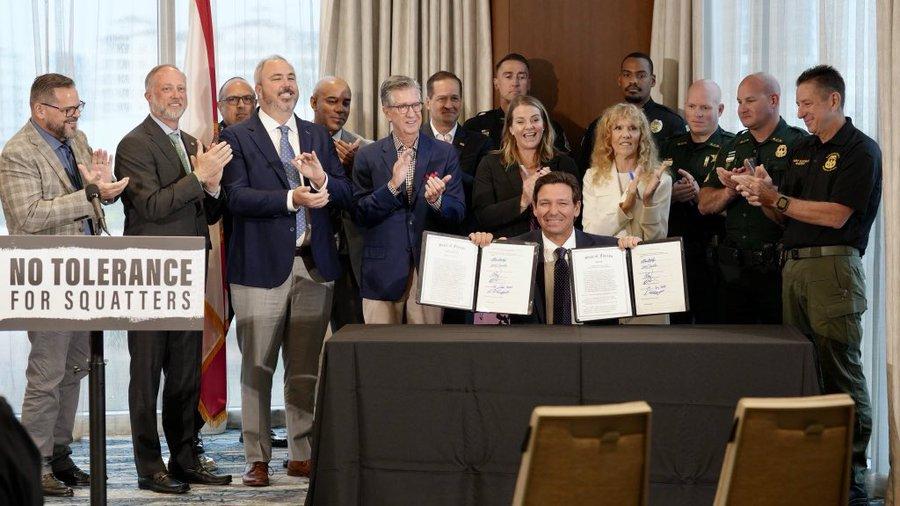
In a bold move to protect property rights and crack down on unlawful squatting, Florida Governor Ron DeSantis has signed two major bills—Senate Bill 322 and Senate Bill 606—into law, reinforcing the Sunshine State’s hardline stance against unauthorized occupants on both residential and commercial properties.
During a press conference accompanied by law enforcement officers, business leaders, and legislators, DeSantis declared,
“Florida doesn’t tolerate squatters; we stand with property owners.”
The newly signed legislation aims to streamline legal processes, empower business and hotel owners, and ensure that scammers and opportunists can no longer exploit legal loopholes to claim other people’s property.
🧾 What the New Laws Do
The two bills represent a significant upgrade to Florida’s property rights framework:
🏢 Senate Bill 322:
-
Empowers commercial property owners to remove unauthorized occupants more quickly.
-
Simplifies court procedures that were previously time-consuming and costly.
-
Minimizes the chances of “professional squatters” using fabricated leases or legal gray areas to delay eviction.
🏨 Senate Bill 606:
-
Gives hotel and motel owners more authority to remove guests who refuse to pay or exhibit uncooperative behavior.
-
Prevents guests from claiming tenant rights under misleading circumstances.
-
Supports tourism businesses by reinforcing accountability and legal clarity.
These new laws expand Florida’s already strong protections for residential homeowners to include commercial landlords and hospitality providers, strengthening Florida’s reputation as a pro-business, pro-property state.
📸 A Symbolic Moment in Florida Law
The now-viral image from the bill-signing ceremony captures Governor DeSantis seated at a table, holding up the newly signed documents, flanked by applauding state leaders and law enforcement officers. A bold sign beside him reads:
“NO TOLERANCE FOR SQUATTERS.”
The image speaks volumes—this isn’t just legislation, it’s a statement.
Florida is putting property rights first and sending a clear message: Illegal occupation will not be tolerated.
🔍 Why This Matters: The Rise of “Professional Squatters”
Across the U.S., squatting has become a growing legal and social issue. In some states, squatters have used outdated tenant laws and forged documents to:
-
Occupy homes while owners are away
-
Delay eviction for months
-
Claim utilities and even attempt to resell the property
The problem is especially serious in cities with high real estate values, where fraudulent squatters use the system to hold homes or commercial buildings hostage. Victims—often homeowners, veterans, or small businesses—are left footing the bill and navigating an uphill legal battle.
🛡️ Florida’s Proactive Approach
Unlike many states struggling to balance tenant rights with property protections, Florida has drawn a firm line.
Governor DeSantis emphasized:
“Florida is a great state to live, visit, and do business because we uphold the rule of law. Scammers looking to game the system… will face consequences and be removed.”
This proactive approach supports Florida’s broader economic goals:
-
Encouraging real estate investment
-
Supporting the tourism and hospitality sector
-
Attracting small business owners and entrepreneurs
With these new laws, Florida positions itself as a national leader in property protection.
👏 Reaction from the Community
The response from local and national leaders has been overwhelmingly positive:
Sheriffs and police departments praised the legislation for allowing faster action and less bureaucratic red tape.
Hotel and business owners said the bills would save them thousands in losses and protect their operations.
Residents expressed relief that homeowners wouldn’t have to fear strangers occupying their property while away.
A Miami-based commercial landlord commented:
“This is exactly what Florida needed. Squatters should not have more rights than property owners.”
🧠 Legal Experts Weigh In
Legal analysts say Florida’s approach could set a precedent for other states grappling with squatting issues. By defining clear processes and giving power back to property owners, the bills aim to restore trust in property law and reduce court backlogs.
Critics of similar laws in other states argue that tenant protections are being eroded, but DeSantis’s team insists the new bills:
-
Do not target legitimate renters or tenants
-
Only address clear cases of unauthorized, deceptive occupation
-
Reinforce due process without enabling abuse
🌴 The Bigger Picture: Florida’s Policy Identity
This legislative move is part of a broader trend in Florida under Governor DeSantis’s leadership—assertive policy-making with a focus on law and order, personal responsibility, and business freedom.
In recent months, the state has passed bills:
-
Supporting parental rights in education
-
Expanding second amendment protections
-
Limiting government overreach
The anti-squatting laws align closely with DeSantis’s image as a tough-on-crime, pro-freedom leader with eyes on potential national influence.
🏁 Final Thoughts
Florida’s latest property protection laws, Senate Bill 322 and 606, mark a decisive victory for homeowners, business owners, and hoteliers. By confronting the squatting crisis head-on, Governor Ron DeSantis is making it clear:
“If you don’t pay, you don’t stay.”
The message is unmissable: Florida is open for business—but closed to squatters.






